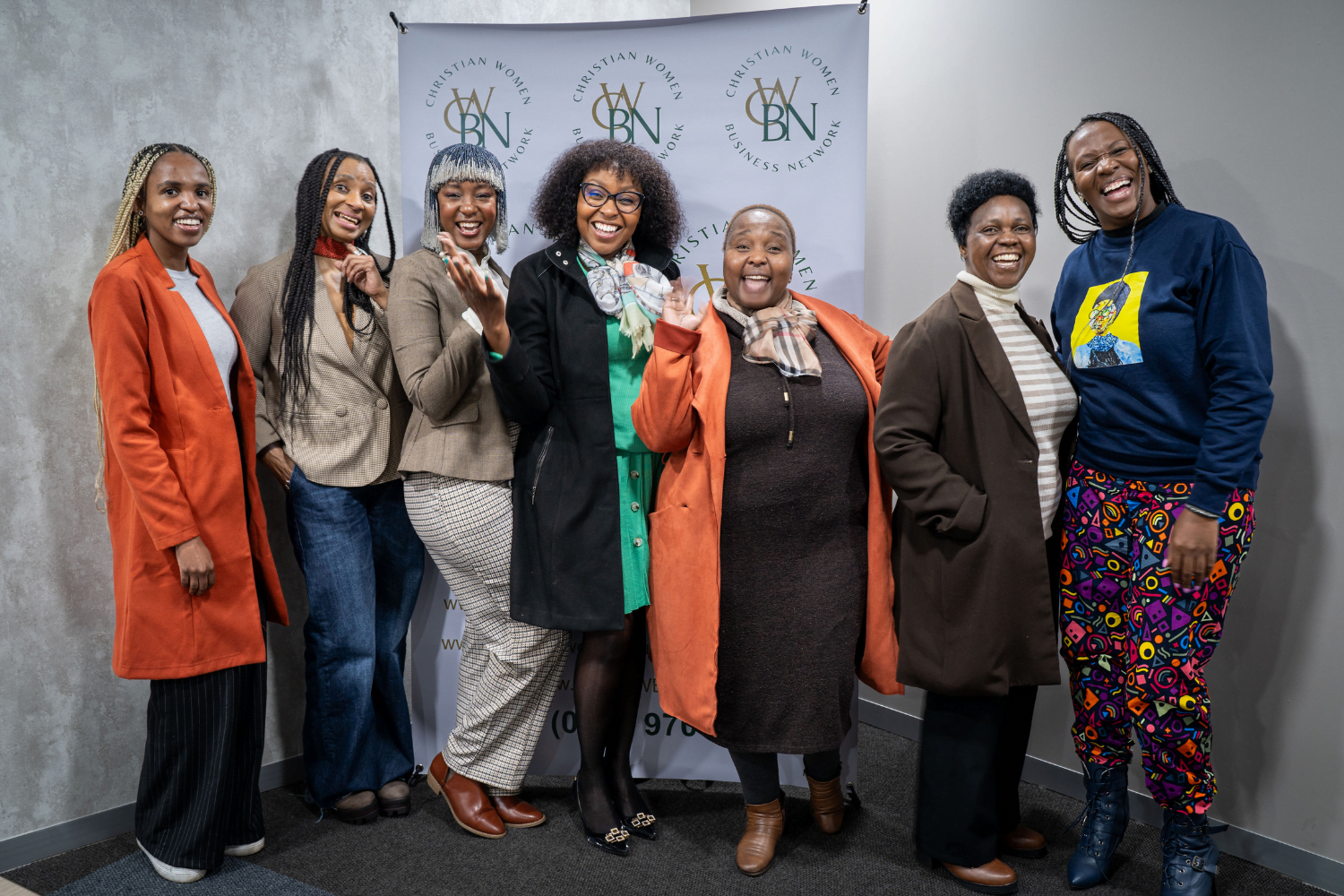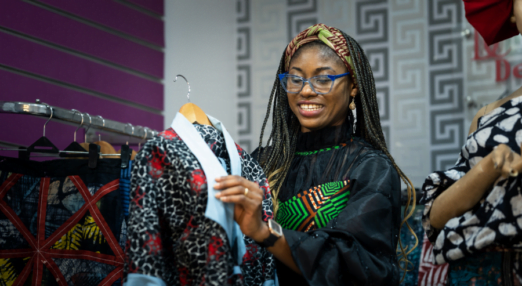Connecting for success: how network building supports women’s businesses
Through our programmes, women entrepreneurs meet and form lasting professional connections. Dermot Nicholas shares his insights.

Networks are vital to women’s business growth. They enable access to markets, opportunities, knowledge and support, underpinning supply chains and economies. That’s why network development is built into all of the support we offer women entrepreneurs. Our Monitoring, Evaluation and Learning Manager, Dermot Nicholas, investigates this link and shares which aspects of programme design can help foster women’s networks and business growth.
At the Cherie Blair Foundation for Women, improving women’s access to supportive networks has long been a central component of our programming. Our 2023 Annual Audit found that, whilst supportive networks are the second-most cited factor to which women attributed their business success, accessing networks remains one of the biggest challenges women entrepreneurs face.
We intentionally design network development into our training and mentoring programmes in order to boost women’s business outcomes. 87% of women who took part in our programmes last year grew their networks, and 83% strengthened their businesses in at least one of the four business growth indicators we monitor: revenue, profitability, number of client/customers, and number of employees.
Swimming is an individual sport, it’s not a team game. You swim for yourself. But as an entrepreneur I know how important it is to have a network around you.
In 2023, we set out to better understand the dynamics and mechanisms of how expanded networks lead to stronger businesses through a series of evaluations of our work in Kenya, South Africa, Guyana and Nigeria.
How do networks boost women’s businesses?
Across the world, but particularly in low and middle income countries, women face a range of gendered barriers to accessing and cultivating networks. These include gender bias, discrimination and social norms, limited mobility, less access to technology, lack of confidence, lack of time due to factors like unpaid care work, and having less money to spend on networking. This stymies the growth of women’s businesses, in turn blocking their financial independence and ultimately spelling weaker local economies.
Networks are critical to business growth for a number of key reasons. Network access is tightly linked with market access, which in turn supports economic health and growth. Given the opportunity to make connections, women in our programmes consistently join forces across sectors, at different parts of supply chains, becoming buyers, product distributors, and service provides, creating a lasting local ecosystem that exceeds the sum of its parts.
The more you grow your networks, the more knowledge you can exchange, and the more markets you gain access to.
Confidence is a critical element to successful entrepreneurship, and is also impacted by networks. Being an entrepreneur, particularly as a woman, can often be a very isolating and lonely experience. We often hear from women that having a network of people who face similar challenges and a similar landscape reassures them that that their experiences are common and that they have a group of confidantes and cheerleaders, providing the confidence to know that they will have somewhere to turn for personal and professional support and advice.
By expanding their networks, women are also better able to share information and knowledge with each other, for example procurement opportunities, local events, business grants, advice on business services and tools, and much more.

Cultivating women’s networks: a how-to guide for programme design
These connections do not happen by accident; growing and expanding networks can and should be an intentional component of programme design. As an example, our suite of ‘Road to’ training programmes support women entrepreneurs in a local area to collaborate in class, share ideas in communal WhatsApp groups, connect with organisations and institutions, support each other to overcome challenges and build confidence through being in a community of like-minded women.
In our Mentoring Women in Business programme, outside of their core mentoring relationship, participants spend a year plugging into the expertise of other mentees and mentors through a facilitated LinkedIn group. Meanwhile, for users of our HerVenture business skills app, each country’s version has a networking feature and is updated with local events for women entrepreneurs to attend and meet up.
Building in repeated, lasting opportunities
Programming should be set up to keep women together over a period of time, with repeated opportunities to encounter and interface with the same people. In the case of modular and sequential programming – such as with our Road to Finance programme, for which participation in Road to Growth is a mandatory pre-requisite – we find that participants are more likely to reinforce their networks when they encounter familiar faces, meaning it makes sense to keep cohorts together. When looking at our work in Kenya, we also found that business connections are enhanced and reinforced by the series of webinars and events that accompany programming as they provide additional connection opportunities.
Leveraging technology to keep participants connected after the programme also proves extremely effective. In the case of our in-person trainings, nearly all women join WhatsApp groups with their classroom cohorts. These typically remain active for at least one to two years after completing their programming.
Considering where women are forming and using connections
The type of interactions women entrepreneurs have with one another influence network growth, with more women reporting to us that they are better able to build on relationships formed during in-person trainings, rather than online. For example, in Guyana, 39% of participants who used our HerVenture app without participating in any in-person training reported that the app helped them build their networks; this number rose to 76% for women participating in in-person elements of our ‘Road to’ programmes. However, we know that for many women, online networks are extremely valuable, particularly given women’s increasing propensity to do business online and make use of digital tools – for example selling online or using fintech like mobile money. If the women in your programmes run businesses that exist online, then building online networks makes sense. If their businesses are largely not tech-enabled, then place the focus on in-person.
Network growth online vs. in-person (%)
Network growth by programme (%)

Creating a culture of support
It’s important for practitioners to avoid assumptions about the perception of networks and the role of natural networks for women, particularly if working in different countries, as our experience tells us that these can be very culturally specific. Although women entrepreneurs share many common challenges across the world, confiding in and supporting other women might not be the norm or come naturally, gender stereotypes about women-owned businesses may be internalised, and practitioners should not rely on the presumption of existing, organic networks between women. In Guyana, for example, many participants in our programmes described the local business culture between women as more competitive than collaborative. Our work as such entailed supporting women to shift their mindsets about working with others through specific guidance and messaging.
Trainers stressed the importance of business niches and how collaboration can be more productive than working in isolation. Group discussions and projects provided opportunities for women to build trust and discover how much they could learn from one another. Facilitators also encouraged explicit collaboration and support between women. As one woman described, “Coach would say to us, ‘In this class, there are 35 of you. By the time you go home today, there will be 35 more likes.’ He emphasized over and over and over: like each other’s pages. Give each other your cards.”
Drawing the strategies together for strong outcomes
Network development should run as a thread through programme design rather than a bolt-on or one-off. Our evaluations have found that when these strategies are deployed together, they promote collaboration within and between cohorts of women, creating a new business ecosystem in which women entrepreneurs become suppliers, distributers and references for one another’s businesses. Data from our evaluations suggests a strong link between improvements in women’s business networks and subsequent improvements in their business performance – as seen in the below charts sharing these correlations for our programme participants in Guyana.
Business outcomes improved by network access (%)
A substantial part of these improved outcomes is driven by women creating and tapping into a network of women entrepreneurs who promote their businesses, use or distribute their products and recommend the businesses to others. Women create collaborations between complementary products and services: salon owners display beauty supplies manufactured by their classmates, and shopkeepers stock food products manufactured by other women they have connected with. Women in one of our Road to Growth cohorts in Berbice, Guyana, created Valentine’s gift baskets with products from each of their small businesses, each filling a different role such as product design or marketing. The power of combining networks helped the group sell out their entire stock for the promotion.
Let’s act
Enabling women entrepreneurs’ access to networks and providing opportunities to enhance their networking skills is vital not just for the women themselves and their businesses, but also for the ripple effect that this creates in their communities. A number of aspects of programme design can facilitate this, intentionally creating opportunities to connect where women could learn from one another, grow in confidence and stay connected post-programming. This ultimately results in material business benefits both immediately and in the longer term.
We call on governments and the private sector to work together and with ourselves and other women-centred organisations to support more women entrepreneurs to expand their networks. In doing so, collaborating stakeholders can support women to grow their revenue, increase their prosperity, create jobs and reach more markets, and to ultimately build stronger business ecosystems in low and middle income countries.
Special thanks to Alana Bunbury-Walton, Upasna Mudlier, Maxine Fredericks, and Abieke Hamilton for sharing their stories and images with us.
Become a corporate partner
Learn how your company can work with us to bring our services to more women entrepreneurs in low and middle income countries.

Read more news...
-

Building confidence: A key to women’s business success
Confidence is crucial for women entrepreneurs' business journeys. Our Senior Manager - Evidence and Learning, Rachel Seftel, explains.
Read more
-

The knowledge ripple effect
Women entrepreneurs don't keep knowledge to themselves, they share it. This creates a massive ripple effect of impact. Lulu Nunn explores how this knowledge cascade can be catalysed.
Read more
-

Bold ambitions create big results: Our 2023 Impact Report is here
Our 2023 Impact Report highlights the year's key achievements and gives a sneak peek at what's to come.
Read more